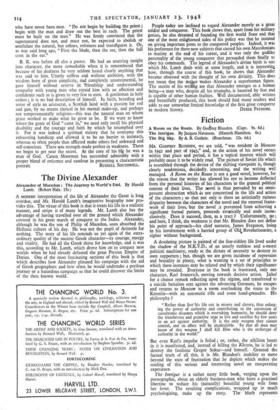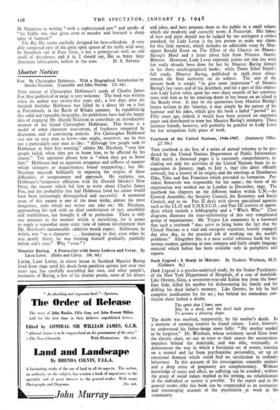Fiction
MR. GODFREY BLUNDEN, we are told, " was resident in Moscow in 1942 and part of 1943," and, as the action of his novel occurs within that place and period, it has a topical interest which will probably cause it to be widely read. The picture of Soviet life which is assembled through the device of the shifting viewpoint is, though clearly tendentious, decidedly, interesting, and the writing well managed. A Room on the Route is not a good novel, however, for the reason that the writer has allowed his eye to become deflected from the personal histories of his characters to the general political context of their lives. The novel is thus pervaded by an omni- present abstraction which .is not concretised in the life and action of the characters ; so that not only is there an artistically ruinous disparity between the characters of the novel and the external frame- work of their lives, but the novel is prevented from achieving a significant formal pattern, proceeds erratically and ends incon- clusively. Does it succeed, then, as a tract ? Unfortunately, no ; and here, I think, the weakness is that Mr. Blunden does not define his point of approach—his chief narrator, James Ferguson, being in his involvement with a harried group of Olct Revolutionaries, a cipher without background.
A desolating picture is painted of the fear-ridden life lived under the shadow of the N.K.V.D., of an utterly ruthless and a-moral political machinery, ready at the dictate of necessity to destroy its own supporters ; but, though we are given incidents of repression and brutality in plenty, what is wanting is a set of principles to which these instances may be related and by which their significance may be revealed. Everyone in the book is frustrated, only one character, Karl Ivanovich, moving towards decisive action. Jailed for a chance remark reflecting upon the regime, and transferred to a suicide battalion sent against the advancing Germans, he escapes and returns to Moscow to a room overlooking the route to the Kremlin—with an automatic rifle and some hand-grenades. His philosophy ?
"Rather than live his life out in misery and slavery, thus enlarg- ing the power of, authority and contributing to the succession of cataclysmic disasters which is overtaking humanity, he should deny the treacherous and primitive urge to live and sacrifice his few years in an act against authority. It is the only weapon they cannot control, and its effect will be incalculable. So that all men may know of this weapon I shall kill Him who is the archetype of authority in the world."
But even Karl's impulse is foiled ; or, rather, the nihilism latent in it is manifested, and, instead of killing the Khozin, he is led to destroy the fatalistic Gregor Sokur—and himself. Granted the factual truth of all this, it is Mr. Blunden's inability to move beyond the state of frustration that he depicts which makes the reading of this serious and interesting novel an exasperating experience.
The Intrigue is a rather nasty little book, verging upon the pornographic, about an elderly business-man who hires a practised libertine to seduce his (naturally) beautiful young wife from her lover. The resulting complications, wrapped up in much psychologising, make up the story. The blurb represents
M. Natanson as writing " with a sophisticated pen " and speaks of " his Gallic wit, that gives even to murder and betrayal a sharp spice of humour."
The Big Sky seems carefully designed for best-sellerdom. A very ably composed epic of the great open spaces of the really wild west, by Steinbeck out of Zane Gray, it has a primitivism with an odd smell of decadence, and it is, I should say, Inte so Many large American fabrications, hollow at the s core. D. S. SAVAGE.































 Previous page
Previous page